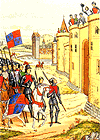|
Expansion of France in
15th-16th centuries
In 1441 the French king regained control of the Paris
area - the "Ile de France" - from the English. Slowly other
areas were regained, but Picardy (south of
Nord/Pas-de-Calais) and Flanders fell under the Duke of
Bergundy in 1435 - see History
of Flanders. In 1477 the French king captured Picardy,
but Flanders became part of the bigger Hapsburg empire
(including Austria).
Field of the Cloth of
Gold
In 1520 Henry VIII of England and François I
of France met at the "Field of the
Cloth of Gold" Guines, on the borders of the English
land at Calais. They tried to impress each other, but failed
to make an alliance.
Loss of
Calais
The area around Calais - the "Pale" - was the last
part of France to be ruled by English kings
*. It was
taken for France in 1558 by the Duke of Guise. Queen Mary of
England said about the loss that, when she died, "Calais
would be engraved on her heart".
* Except
for Dunkerque, which was captured from the Spamish
Netherlands by Oliver Cromwell in 1658, and sold to the
French by king Charles II in 1662 - see "Jean
Bart - 'pirate' ".
18th century
wars
England and France fought over colonies in north
America. Many poor people from distressed areas in the north
- some fleeing religious persecution - emigrated across the
Atlantic. Both countries had colonies in Canada - the French
colonies in Quebec were eventually captured by England, but
remain French-speaking to this day.
France supported the American colonists in their fight
for independence from British rule - which led to war and
the Declaration of Independence in 1776.
Napoleonic
Wars
Following the French
Revolution in 1789, the English aristocracy feared
similar uprisings across the Channel. They sent armies to
fight in France in support of Royalist
counter-revolutionaries. In 1803 before he became Enperor,
Napoleon was asked to prepare for
invasion of England. Continuous wars at sea and across the
Continent eventually led to the successful invasion of
France in 1814 by an alliance of Enland and all the
neighbouring countries that France had conquered. Napoleon
was exiled - a brief return to try and regain the support of
the French people led to his final defeat by an Allied army
led by the English Duke of Wellington at the Battle of
Waterloo in Belgium.
19th
century
During the 19th century France was generally regarded
as the traditional and most-likely enemy of England. Only
slowly towards the end of the century did feelings in
England change to consider the rise of Germany as more
threatening.
|


